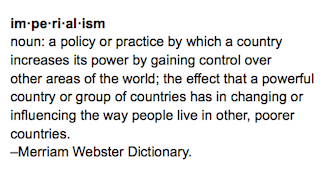
After all we’ve learned from the Edward Snowden leaks, it is impossible to be surprised by The Intercept‘s report that the NSA is “secretly intercepting, recording, and archiving the audio of virtually every cell phone conversation on the island nation of the Bahamas.” But Americans ought to be upset by this revelation. It won’t do to shake our head, shrug our shoulders, and just accept what no longer has the power to shock us. This is a perfect illustration of the need for reforms that rein in the global surveillance apparatus we’ve created so that it is better aligned with American values and interests.
 Our approach in the Bahamas has an arrogance similar to imperialism. “The U.S. intelligence community routinely justifies its massive spying efforts by citing the threats to national security posed by global terrorism and unpredictable rival nations like Russia and Iran,” The Intercept notes. “But the NSA documents indicate that SOMALGET has been deployed in the Bahamas to locate ‘international narcotics traffickers and special-interest alien smugglers’—traditional law-enforcement concerns, but a far cry from derailing terror plots or intercepting weapons of mass destruction.”
Our approach in the Bahamas has an arrogance similar to imperialism. “The U.S. intelligence community routinely justifies its massive spying efforts by citing the threats to national security posed by global terrorism and unpredictable rival nations like Russia and Iran,” The Intercept notes. “But the NSA documents indicate that SOMALGET has been deployed in the Bahamas to locate ‘international narcotics traffickers and special-interest alien smugglers’—traditional law-enforcement concerns, but a far cry from derailing terror plots or intercepting weapons of mass destruction.”
The article raises these powerful objections:
- “By targeting the Bahamas’ entire mobile network, the NSA is intentionally collecting and retaining intelligence on millions of people who have not been accused of any crime or terrorist activity. Nearly five million Americans visit the country each year, and many prominent U.S. citizens keep homes there, including Sen. Tom Harkin (D-Iowa), Bill Gates, and Oprah Winfrey.”
- “The program is a serious—and perhaps illegal—abuse of the access to international phone networks that other countries willingly grant the United States for legitimate law-enforcement surveillance.”
The Intercept also poses the billion-dollar question: “Why would the NSA choose to apply a powerful collection tool … against the Bahamas, which poses virtually no threat to the United States? The answer may lie in a document that characterizes the Bahamas operation as a ‘test bed for system deployments, capabilities, and improvements’ … The country’s small population—fewer than 400,000 residents—provides a manageable sample to try out the surveillance system’s features …. the Bahamas may be used as a sort of guinea pig to beta-test improvements and alterations…”
Rather than using America’s might to steal minerals or fossil fuels or labor, like traditional imperialists, we’re stealing conversations and destroying privacy. Like imperialists of old, part of the logic is that if we don’t do it other powerful nations might well step into the breach to extract information themselves. This “information imperialism” obviously isn’t as awful or immoral as British, French, Japanese, or German imperialism, or the American variety in the Philippines, or our Cold War behavior in Latin America, but that doesn’t mean that America’s actions aren’t arrogant, heavy-handed, and wrong.
NSA defenders will say that this sort of spying is within the agency’s mandate. It’s a foreign intelligence organization. Surveillance on foreigners is all in the game. They’ll insist nothing about this program violates the U.S. Constitution. While that may be strictly true, it ignores the spirit of the document and the logic behind the Bill of Rights, and especially the Fourth Amendment.
The patriots who revolted against King George’s general warrants didn’t do so because Britain violated the letter of a Bill of Rights that didn’t yet exist. They argued that it was tyrannical for a distant power to forcibly intrude on the privacy of whole populations. They thought that insofar as law enforcement justified intrusions into privacy, searches were only legitimate if they were conducted with reasonable suspicion of wrongdoing and an individualized warrant. Living up to the spirit of the Fourth Amendment abroad is tricky and may require some compromises at times. No one expects the U.S. military to obtain individualized warrants in war zones. But mass surveillance on every mobile-phone call made in a nation at peace that poses no threat to us crosses all lines.
That’s why I’ve focused on the Bahamas, though the Intercept article about spying there also includes details about seemingly objectionable spying elsewhere. Nadia Kayyali of the Electronic Frontier Foundation thinks she knows what happens next:
These revelations are likely to further damage the U.S.’s reputation and relationship, not only with the named countries, but with other countries as well. The global community is increasingly concerned about U.S. surveillance, and until the President and Congress address NSA overreach, we will not repair those relationships.
This is, of course, exactly how Americans would react if we discovered that a foreign country was recording and storing every cell-phone call made in this country. We’d be outraged. Diplomatic relations would break down. U.S. politicians would be inveighing against their arrogant leaders and making impassioned statements denouncing anyone who’d presume to spy on virtually every American.
But we’d also wonder why they bothered. The possibility that the NSA is wasting a lot of resources in the Bahamas shouldn’t be ruled out. Virtually incomprehensible waste and inefficiency certainly pops up often in the parts of the federal government that aren’t cloaked in secrecy. Can American national security remain strong despite an end to mass surveillance on all calls in the Bahamas? I challenge anyone to persuasively argue it cannot.















